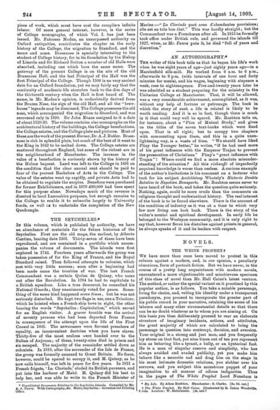AN AUTOBIOGRAPHY.*
THE writer of this book tells us that he began his life's work when he was eight years of age—just eighty years ago—in a Macclesfield silk-mill. He worked from 6 a.m. to 6 p.m., afterwards to 8 p.m. (with intervals of one hour and forty minutes for meals), and his wages, beginning with sixpence a week, rose to eighteenpence. Five-and-twenty years later he was admitted as a student preparing for the ministry in the Unitarian College at Manchester. That, it will be allowed, was a very considerable achievement, accomplished, as it was, without any help of fortune or patronage. The book in which the story of such a life is related is likely to be worth reading. And it is so in fact, though there is much in it that could very well be spared. Mr. Rushton tells us, for instance, about a "Plan of Mutual Study," . and gives us the titles of the seven text-books which were fixed upon. That is all right; but to occupy two chapters with commenting upon them, and this in a quite unen- lightening way, is a waste of time. "We should have liked Pliny the Younger better," he writes, "if he had used more of his great influence with the Emperor Trajan to prevent the persecution of Christiana." Pliny's "great influence with Trojan"! Where could we find a more absolute misunder- standing of the situation P All this rechauffe of imperfectly acquired knowledge is worse than useless. A curious example of the author's limitations is his comment on a lecturer who took for his subject Archbishop Whately's Historic Doubts Relative to Napolebn Bonaparte. Mr. Rushton seems never to have heard of the book, and takes the question quite seriously. Nothing, again, could be more crude than the comments on religious thought and ecclesiastical history. The real interest of the book is to be found elsewhere. There is the account of the condition of industry as it was at a time to which very few now living can look back. There is the story, of the writer's mental and spiritual development. In early life he belonged to the Wesleyan community, and it is only right to say that, however fierce his diatribes against priests in general, he always speaks of it and its leaders with respect.






































 Previous page
Previous page